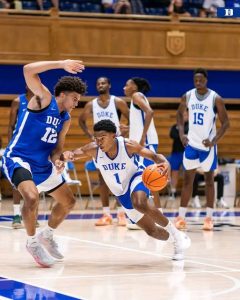
In a moment that echoes through the hallowed halls of college football history, Barry Switzer, the legendary former head coach of the Oklahoma Sooners, has been awarded the prestigious National Football Foundation (NFF) Gold Medal, the organization’s highest honor. Recognized for his extraordinary contributions to the game, his lifelong commitment to leadership, and his impact beyond the gridiron, Switzer becomes one of the few towering figures in football to receive the Gold Medal—joining the ranks of icons such as Dwight D. Eisenhower, Bill Cosby, and Tom Osborne.
This accolade not only cements Switzer’s legacy as one of the greatest coaches in college football history, but it also serves as a testament to his influence as a mentor, innovator, and ambassador for the sport. The award is given only in rare circumstances when an individual’s impact transcends wins and titles, touching communities and lives through values espoused by the NFF: leadership, sportsmanship, and integrity.
A Coaching Legacy Etched in Crimson and Cream
Barry Switzer’s coaching resume speaks for itself. During his tenure at the University of Oklahoma from 1973 to 1988, Switzer led the Sooners to three national championships (1974, 1975, and 1985) and twelve Big Eight Conference titles. His overall college coaching record—157 wins, 29 losses, and 4 ties—is one of the most dominant in NCAA history.
Known for his charismatic leadership and strategic innovation, Switzer was the architect of the Wishbone offense, a ground-and-pound scheme that overwhelmed opponents and revolutionized offensive playbooks across the country. Under his leadership, Oklahoma became synonymous with dominance, developing a culture of excellence that few programs could match. His 1974 and 1975 teams went undefeated in back-to-back seasons, showcasing not only athletic superiority but also a well-oiled coaching machine at the helm.
From Arkansas Roots to National Stardom
Switzer’s journey to coaching immortality began in Crossett, Arkansas, where he was born in 1937. A standout high school athlete, he went on to play for the University of Arkansas as a center and linebacker under head coach Frank Broyles. Following a brief stint in the U.S. Army, he returned to Arkansas as an assistant coach before joining the Oklahoma Sooners’ coaching staff in 1966.
By the time he was named head coach in 1973, Switzer had already established himself as an offensive mastermind. His rise was meteoric, and within just two years, he had captured his first national championship. Known as “The King” in Norman, Oklahoma, Switzer’s teams represented a combination of discipline, swagger, and relentless execution.
NFL and the Dallas Cowboys: Completing the Trinity
After stepping away from college football in the late 1980s, Switzer’s football journey was far from over. In 1994, he returned to the sidelines—this time in the NFL—when he became the head coach of the Dallas Cowboys. Many doubted whether his collegiate success would translate to the professional ranks, but Switzer quickly silenced critics. Just two years into his NFL coaching career, he led the Cowboys to victory in Super Bowl XXX, becoming only the second coach in history—along with Jimmy Johnson—to win both a college national championship and a Super Bowl.
This unique achievement etched his name into an elite club and demonstrated his ability to inspire and manage athletes at the highest levels of the sport. Whether it was commanding a college locker room or guiding NFL veterans, Switzer’s leadership style—bold, authentic, and fiercely competitive—proved universally effective.
A Coach, A Mentor, A Humanitarian
What makes Barry Switzer’s receipt of the NFF Gold Medal particularly significant is not just his record between the lines, but his unwavering commitment to community service and mentorship. After retiring from coaching, Switzer remained deeply involved in philanthropic efforts across Oklahoma and the nation. He’s been a vocal advocate for underprivileged youth and education, often using his platform to spotlight causes bigger than football.
Switzer founded the “Inner City Football League” in Oklahoma City, providing a safe and structured outlet for at-risk youth to learn life lessons through sport. He has also been active in programs supporting military families and veterans, drawing from his own military background.
Perhaps one of his most impactful ventures was the creation of “SoonerStart”, an early intervention program designed to help young children with developmental delays. Switzer’s work has positively affected thousands of lives, making him a champion not just of teams, but of people.
Switzer on the Gold Medal: “A Humbling Honor”
Upon receiving the National Football Foundation’s Gold Medal, an emotional Barry Switzer addressed a packed room of current and former athletes, coaches, and dignitaries.
“To receive this medal is truly humbling,” Switzer said. “I’ve always believed football is about much more than wins and trophies. It’s about building character, creating bonds that last a lifetime, and using the game to give back. I’m grateful to the National Football Foundation for this honor and to everyone who’s been part of my journey.”
The ceremony, held at the New York Hilton Midtown during the 2025 NFF Annual Awards Dinner, was a who’s who of college football royalty. Fellow honorees, including recent Hall of Fame inductees and Heisman Trophy winners, gave Switzer a standing ovation that lasted nearly three minutes.
Recognition Across Generations
Current Oklahoma head coach Brent Venables, who played for and coached under many Switzer disciples, spoke highly of the honor:
“Coach Switzer laid the foundation for what Oklahoma football stands for. His influence is everywhere—from the way we train to the way we lead. This honor is not only deserved, it’s overdue.”
Former Dallas Cowboys quarterback Troy Aikman, who played under Switzer in the NFL, also offered praise:
“He had the ability to connect with anyone—whether you were a rookie trying to make the team or a Pro Bowler. Coach Switzer taught us how to win with respect and class. He changed my life.”
Even legendary rivals paid tribute. Tom Osborne, former Nebraska head coach and one-time coaching adversary, sent a personal message:
“We had our battles, but there was always a mutual respect. Barry’s success and leadership speak volumes. He’s a deserving recipient of this great honor.”
A Torch That Still Burns Bright
Even at 87 years old, Barry Switzer remains a visible and vocal figure in the football world. Whether he’s making appearances on Oklahoma sidelines, providing commentary, or mentoring young coaches, Switzer’s torch continues to burn brightly. His ability to bridge generations—connecting past traditions with the modern game—makes him not only a legend but a living link to football’s enduring soul.
The NFF Gold Medal isn’t just a capstone—it’s a celebration of a life well lived in service to a game that continues to inspire millions. As college football evolves through eras of realignment, NIL, and transfer portals, figures like Barry Switzer remind us of the game’s enduring values: loyalty, passion, community, and character.





